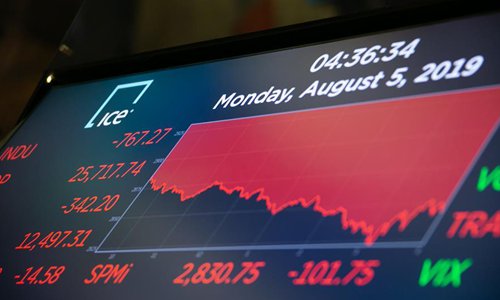
Trading chart is seen on an electronic screen at the New York Stock Exchange in New York, the US, on August 5, 2019. US stocks plunged as investors worry that US President Donald Trump's threatened new tariffs on Chinese imports will worsen trade prospects. The Dow Jones Industrial Average decreased 767.27 points, or 2.90 percent, to 25,717.74. The S&P 500 fell 87.31 points, or 2.98 percent, to 2,844.74. The Nasdaq Composite Index was down 278.03 points, or 3.47 percent, to 7,726.04. (Photo: Xinhua)
The new round of US tariffs of 15 percent on Chinese goods, which kicked in over the weekend, will likely spur inflation on the American market, and amounted to a political gamble by Washington to the detriment of its own economy and taxpayers, Chinese experts said.
At 12:01 am (US time) on Sunday the Trump administration started imposing a 15 percent tax on an estimated $125 billion of Chinese products including clothing, footwear, sunglasses, cameras, television components, turkeys and beef cuts.
The Chinese experts said the US action was hurting itself, and if the country continued with the policy, the outcome may exceed US tolerance.
US President Donald Trump said on August 1 that he would target $300 billion of Chinese products with a 10 percent tariff starting from September 1.
On August 14, Trump decided to divide the tariff into two phases due to US retailers' worries about holiday season sales, with a second round being put off to December 15.
But he announced on Twitter on August 24 that the increase was up to 15 percent from 10 percent, escalating the trade war after China hit back with retaliatory tariffs on $75 billion worth of US imports on August 23.
"Trump's action will not help realize his 'America First' policy as pressure exerted by tariffs has already penetrated the US consumption market," said Gao Lingyun, a research fellow at the Chinese Academy of Social Sciences in Beijing.
If American importers, who have to pay most of the addtional levies, cannot digest the tariff burden, they will pass the pressure to downstream industries and US consumers, who will finally pay the bill, Gao noted.
From July 2018 to the end of August 2019, the US bore around 70 percent of the impact from tit-for-tat tariffs, while China shouldered the remaining 30 percent, Gao said.
A Chinese doctorate candidate in Buffalo, who only gave his surname as Liu, told the Global Times on Sunday "The retail price of beef in the local supermarket rose by nearly 20 percent since July."
The price hike forced some local consumers to consider alternatives, he said.
The price of eggs and milk rose by $1 during recent months in local marts in Minneapolis, a college student who only gave her name as "Yvonne" told the Global Times.
She said that farmers in Minnesota were hit hard by tariffs, with more than 1,000 cattle farms shut down and the local American ginseng industry seeing sales decline 30 percent by 2019.
Tariffs will bring around $1 trillion losses to the US economy in the coming 10 years, China's Commerce Ministry said on June 27, citing US industries.
American consumers will spend $4.4 billion more on clothes, $2.5 billion more on shoes, $3.7 billion more on toys and $1.6 billion more on house ware each year, the ministry said.
No compromise
China's trade war stance is firm, Huo Jianguo, a vice chairman of the China Society for World Trade Organization Studies, told the Global Times.
China will not give in or compromise easily, he said. China has more retaliatory tools with more scope for tariffs on American imports compared to the US that is likely to levy a tax on almost all Chinese goods by December 15, experts said.
On August 23, the Chinese government hit back at US tariffs by announcing it would impose additional tariffs of 10 percent and 5 percent on $75 billion of US products. The first batch of tariffs took effect on September 1 and the second on December 15.
"Other retaliation measures, such as China's unreliable entity list that is being drawn up, is likely to be released at a proper time during progress of bilateral trade talks in the near future," Gao said.
But Chinese experts took a dim view on the possibility that both sides could reach a trade deal in a short period of time as they said the US had not shown a sincere attitude toward addressing problems.
In their view, Washington was continuing to adopt maximum pressure tactics against China despite trade talks being scheduled later in September.
But according to Huo, the US should not dawdle about signing agreements with China as Trump faces fresh challenges such as the sliding US economy and his own reelection.


